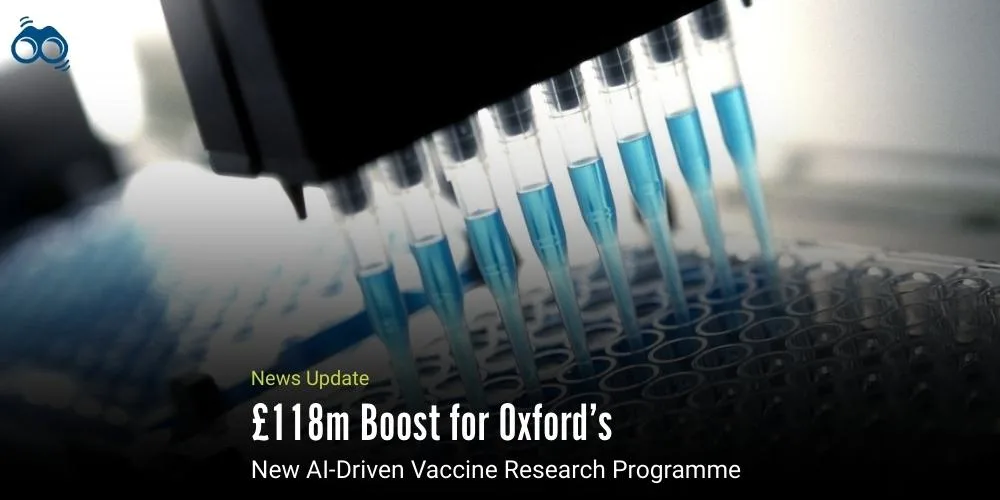Oxford–EIT CoI-AI Programme Combines Human Challenge Models and AI for Immunology Breakthroughs
Oxford–EIT Partnership Applies AI to Advance Vaccine Development Against Global Pathogens
In a major step forward for global health innovation, the University of Oxford, in collaboration with the Ellison Institute of Technology (EIT), has secured £118 million in research funding to launch a pioneering artificial intelligence programme focused on vaccine development. The initiative, CoI-AI (Correlates of Immunity–Artificial Intelligence), aims to deepen scientific understanding of how the human immune system responds to infectious diseases, particularly those that have resisted traditional vaccine approaches. At a time when antibiotic resistance and emerging pathogens pose growing threats to public health, this investment reflects the urgent need for smarter, faster, and more targeted vaccine solutions powered by cutting-edge AI and immunology.
According to the announcement, the CoI-AI programme will investigate immune responses to key pathogens, including Streptococcus pneumoniae, Staphylococcus aureus, and E. coli, organisms responsible for millions of infections globally and increasingly linked to antimicrobial resistance. For instance, Streptococcus pneumoniae is a leading cause of pneumonia and meningitis in children under five, while Staphylococcus aureus and E. coli are major contributors to hospital-acquired infections and sepsis. These pathogens have historically resisted conventional vaccine development, making them high-priority targets for innovation. Researchers will employ controlled human challenge models, a method where volunteers are safely exposed to pathogens under clinical supervision. This approach allows scientists to observe immune responses in real time, offering valuable insights into how protection is achieved. Oxford is one of the few institutions globally with a dedicated human challenge facility, having previously used this model in trials for malaria, typhoid, and COVID-19 vaccines.
The programme will also harness advanced artificial intelligence tools developed by EIT to analyse complex immunological data, including gene expression, protein activity, and cellular imaging. These AI models are designed to identify “correlates of protection”, specific immune responses that reliably predict whether a vaccine will be effective. The data infrastructure supporting this work will be powered by Oracle’s cloud computing capacity, enabling large-scale analysis and rapid model refinement.
Professor Sir Andrew Pollard, Director of the Oxford Vaccine Group, described the initiative as addressing one of the most pressing challenges in infectious disease. He noted that combining modern immunology with AI and human challenge models would help generate the tools needed to tackle serious infections while reducing reliance on antibiotics. Professor Daniela Ferreira, Deputy Director, added that the programme would allow scientists to study infections as they happen and develop new approaches to vaccine design, creating transformative opportunities for medical research. Larry Ellison, Chairman of EIT, emphasised that the human AI models developed at the institute would accelerate vaccine discovery, making it more responsive to global health threats. Professor Irene Tracey, Vice-Chancellor of Oxford, stated that the partnership marked a significant advancement in the university’s alliance with EIT, combining Oxford’s leadership in medical science with the institute’s vision for technology-driven solutions.
The collaboration between Oxford and EIT was formalised in December 2024, with both parties committing to tackling major global health and societal challenges through joint research, science innovation, and talent development. EIT’s broader scientific portfolio includes expertise in generative biology, clinical medicine, plant science, sustainable energy, and public policy, supported by a strong AI research team and Oracle’s infrastructure. Plans are also underway to establish a dedicated EIT campus in Oxford by 2027, with a projected investment of £1 billion in laboratories, computing facilities, and interdisciplinary research hubs. Commentators have noted that the CoI-AI initiative carries wider implications for research careers, student training, and the integration of technology in global health. It is seen as a model for how leading institutions can align artificial intelligence with urgent health needs, advancing both scientific discovery and societal impact.
Editor’s Note
The launch of the CoI-AI programme by the University of Oxford and the Ellison Institute of Technology marks a timely and strategic response to one of the most pressing challenges in global health: the development of effective vaccines against pathogens that continue to evade traditional approaches. With Streptococcus pneumoniae, Staphylococcus aureus, and E. coli responsible for millions of infections and deaths annually and increasingly linked to antimicrobial resistance, the need for innovation in vaccine science has never been more urgent. AI offers unprecedented capabilities in the health sector: it can analyse vast and complex immunological datasets, identify patterns invisible to the human eye, and accelerate the discovery of immune correlates that predict vaccine efficacy. When combined with Oxford’s expertise in human challenge models and immunology, this approach has the potential to transform how vaccines are designed, tested, and deployed. With Oracle’s cloud computing capacity and EIT’s cross-sectoral expertise, from generative biology to public policy, the partnership is well-positioned to deliver both scientific breakthroughs and scalable health solutions. Plans for a dedicated Oxford–EIT campus further reinforce the long-term vision for talent development, research careers, and global impact.
Skoobuzz underscores that in an era of rising antimicrobial resistance and emerging infectious threats, the CoI-AI initiative exemplifies how artificial intelligence can be harnessed to advance public health, accelerate vaccine innovation, and strengthen institutional leadership in science.














0 Comments (Please Login To Continue)